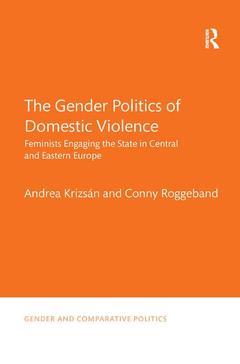The Gender Politics of Domestic Violence Feminists Engaging the State in Central and Eastern Europe Gender and Comparative Politics Series
Auteurs : Krizsán Andrea, Roggeband Conny

What are the factors that shape domestic violence policy change and how are variable gendered meanings produced in these policies? How and when can feminists influence policy making? What conditions and policy mechanisms lead to progressive change and which ones block it or lead to reversal?
The Gender Politics of Domestic Violence analyzes the emergence of gender equality sensitive domestic violence policy reforms in Central and Eastern Europe (CEE). Tracing policy developments in Eastern Europe from the beginning of 2000s, when domestic violence first emerged on policy agendas, until 2015, Andrea Krizsán and Conny Roggeband look into the contestation that takes place between women?s movements, states and actors opposing gender equality to explain the differences in gender equality sensitive policy outputs across the region.
They point to regionally specific patterns of feminist engagement with the state in which coalition-building between women?s organizations and establishing alliances with different state actors were critical for achieving gendered policy progress. In addition, they demonstrate how discursive contexts shaped by democratization frames and opposition to gender equality, led to differences in the politicization of gender equality, making gender friendly reforms more feasible in some countries than others.
Preface 1. Introduction: The Gender Politics of Domestic Violence Policy Reforms in Central and Eastern Europe 2. Five Stories of Change 3. Mapping Gendered Meanings of Domestic Violence Legal and Policy Reforms: Comparing Policy Change Over Time 4. Politicizing Domestic Violence: Dynamics of Gendered Structures 5. Comparing Women’s Movements Across the Region 6. How Does Gender Disappear and Reappear in Domestic Violence Policy Regimes 7. Conclusions: Gendering Domestic Violence Policies
Andrea Krizsán is a Research Fellow at the Center for Policy Studies, Central European University, Budapest. Her research focuses on the comparative politics of gender inequality and violence against women and intersectionality in Central and Eastern Europe.
Conny Roggeband lectures at the Department of Political Science at the University of Amsterdam. Her research interests include gender mainstreaming and equality policies, gender-based violence, social movements and transnational feminist networking.
Date de parution : 07-2019
15.2x22.9 cm
Date de parution : 11-2017
15.2x22.9 cm
Thème de The Gender Politics of Domestic Violence :
Mots-clés :
Domestic Violence Policy; Women’s Policy Agencies; Domestic Violence; CEDAW Reporting; Policy Reform; CEDAW Committee; Women's Movements; Gender Equality; Women's rights; Cee Country; Bulgaria; Open Society Institute; Croatia; Istanbul Convention; Hungary; NGO Coalition; Andrea Krizsan; National Action Plan; Poland; Gender Equality Frame; Romania; Women’s Rights Advocates; Comparative Politics; Victim Support; Gender Politics; Domestic Advocacy Groups; Public Policy; Gendered Policy Regime; Central and Eastern Europe (CEE); Cee Region; Social Movements; Resonant Framing; European Union; Domestic Violence Reforms; Convention on the Elimination of all Forms of Discrimination Against Women (CEDAW); Frame Domestic Violence; Council of Europe; Women’s Rights Groups; Gendered Structures; Domestic Violence Debates; Gender Equality Claims; Transnational Actors; Policy Issue; International Relations; Insider Allies; European Studies; Protection Pillar; Norm Dissemination; domestic violence policy change; global feminist network



